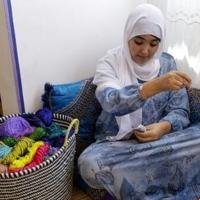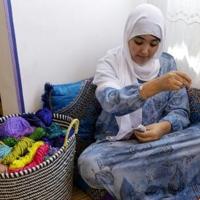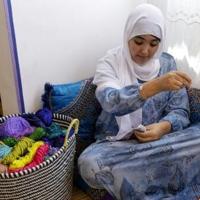ROME — The Knights of Columbus, an influential Catholic charitable organization, announced Thursday that it will cover up its mosaics made by a famous ex-Jesuit artist accused of abusing women in a sign of solidarity with victims of abuse.
The world’s largest Roman Catholic fraternal group said the organization would for now place fabric over the mosaics at its shrine in Washington, and at a chapel at its headquarters in New Haven, Conn. A permanent plaster covering “may be in order,” depending on the outcome of the Vatican’s investigation into the Rev. Marko Rupnik, the group said in a statement.
Rupnik, whose mosaics grace some of the most important and visited Catholic shrines around the world, has been accused by over 20 women of psychological, spiritual and sexual abuses over decades.
The scandal about his alleged abuse has grown steadily, and implicated Pope Francis, since the Vatican and his Jesuit order long ignored the women’s complaints until their stories were published in late 2022 in Italian blogs and newspapers.
The decision by the Knights to cover their mosaics marks the first announcement by a major church, organization or diocese to heed victims’ requests to cover or remove the works that are accessible to the public.
Rupnik, a charismatic preacher, co-founded a Jesuit-inspired community in his native Slovenia and then opened an atelier in Rome that received commissions to mount mosaics at some of the Catholic Church’s most important sanctuaries, in Lourdes, France; Fatima, Portugal and even the Vatican’s own Apostolic Palace.
The scandal about his alleged abuse posed the question about what to do with the mosaics, because some of his victims say the mosaics were a traumatic reminder of what they had endured. For others, they became a symbol of the church’s continued indifference to adult victims of abuse.
Laura Sgro, a Rome lawyer who represents five women who say they were abused by Rupnik, welcomed the Knights’ decision. “We are grateful for this decision, for this act of great respect shown to the victims,” she told The Associated Press.
The bishop of Lourdes earlier this month put off a decision on what to do with the mosaics that decorate the facade of the basilica at the popular Marian sanctuary, though he said he favored removing them.
The Jesuits expelled Rupnik from the order last year, and Pope Francis ordered a new canonical trial against him following an outcry that his victims hadn’t received justice and suspicions that he had been protected by Jesuits up to and including the pope.
Rupnik hasn’t responded to the allegations and refused to cooperate with an investigation by his former Jesuit order, which determined that the women’s claims against him were “very highly credible.” His collaborators have denounced what they called a media “lynching” against him.
The debate over what to do with his artwork exploded anew last month after the Vatican’s communications chief, Paolo Ruffini, defended keeping Rupnik’s artwork on the Vatican News website.
That prompted the pope’s top anti-abuse adviser, Cardinal Sean O’Malley, to send a letter to all Vatican offices urging them to stop featuring Rupnik’s artwork. O’Malley said continuing to promote it ignores the pain of victims and could imply a defense of the Slovenian priest.
The Knights of Columbus, a U.S. insurance company and charitable organization, has been a major donor to the Vatican communications operations, and is currently funding the restoration of the Baldacchino altar canopy in St. Peter’s Basilica.
The Knights decided to cover the mosaics at least until the Vatican rules on Rupnik’s fate “because our first concern must be for victims of sexual abuse, who have already suffered immensely, and who may be further injured by the ongoing display of the mosaics at the shrine,” said Patrick Kelly, who heads of the organization.
The Knights said their decision was the fruit of a long review process that involved speaking with victims of abuse, those who minister to them as well as pilgrims, moral theologians, art historians, bishops and other clergy.
“While opinions varied among those consulted, there was a strong consensus to prioritize the needs of victims, especially because the allegations are current, unresolved, and horrific,” the statement said.
The Knights noted that the U.S. context was taken into consideration in the consultations. The U.S. clergy sex abuse scandal erupted in 2002 but the continued legacy of abuse and decades of cover-up by bishops and religious superiors has sorely undermined the credibility of the Catholic hierarchy.
This post was originally published on this site be sure to check out more of their content







